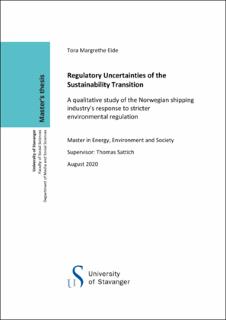| dc.contributor.advisor | Sattich, Thomas | |
| dc.contributor.author | Eide, Tora Margrethe | |
| dc.date.accessioned | 2021-02-16T12:41:54Z | |
| dc.date.available | 2021-02-16T12:41:54Z | |
| dc.date.issued | 2020-08-21 | |
| dc.identifier.uri | https://hdl.handle.net/11250/2728398 | |
| dc.description | Master's thesis in Energy, Environment and Society | en_US |
| dc.description.abstract | In a paradox, the shipping industry is one of the most heavily regulated industries, without one single authority charged by governing the international industry. There is not one regulative centre, but many, including the International Maritime Organization, the European Union, national governments, organizations, and institutions. The governance complex of several regulators in the sustainability transition leads to regulatory uncertainties, which are further complicated by uncertainties regarding lack of mature zero- and low-carbon technology and a weak financial situation. The regulatory uncertainties serve as a threat to the maritime sustainability transition and might hinder an acceleration. To reach the ambitious emission reduction targets and to overcome the challenges presented, willingness - and capabilities to invest in green technology, stable framework conditions, and cooperation between authorities and industry are required. This thesis investigates the corporate responses strategies to environment regulation of the Norwegian shipping industry, which holds the world’s fifth largest fleet measured in value.
The corporate response strategies present two models: the reactive – and proactive models. To overcome the challenges, and despite the future regulatory uncertainties, the Norwegian shipping industry is pursuing a proactive strategy, meaning the industry supports, and even advocates for stricter environmental regulations. The thesis show that the Norwegian shipping industry is highly ambitious, aiming at boosting their competitive advantage and early mover advantage, by beyond compliance measures and move beyond ‘business-as-usual’.
This thesis provides in-depth analyses of factors of company-external political responses and company-internal market responses, including challenges and opportunities of the sustainability transition of the shipping industry. The findings are discussed within the proactive response strategy, to which a more transparent understanding of the Norwegian shipping industry in the sustainability transition becomes illuminated. | en_US |
| dc.language.iso | eng | en_US |
| dc.publisher | University of Stavanger, Norway | en_US |
| dc.relation.ispartofseries | Masteroppgave/UIS-SV-IMS/2020; | |
| dc.rights | Navngivelse 4.0 Internasjonal | * |
| dc.rights.uri | http://creativecommons.org/licenses/by/4.0/deed.no | * |
| dc.subject | proactive response strategy | en_US |
| dc.subject | norsk shippingindustri | en_US |
| dc.subject | shipping | en_US |
| dc.subject | bærekraft | en_US |
| dc.title | Regulatory Uncertainties of the Sustainability Transition: A qualitative study of the Norwegian shipping industry’s response to stricter environmental regulation | en_US |
| dc.type | Master thesis | en_US |
| dc.subject.nsi | VDP::Teknologi: 500::Miljøteknologi: 610 | en_US |
| dc.subject.nsi | VDP::Samfunnsvitenskap: 200 | en_US |

